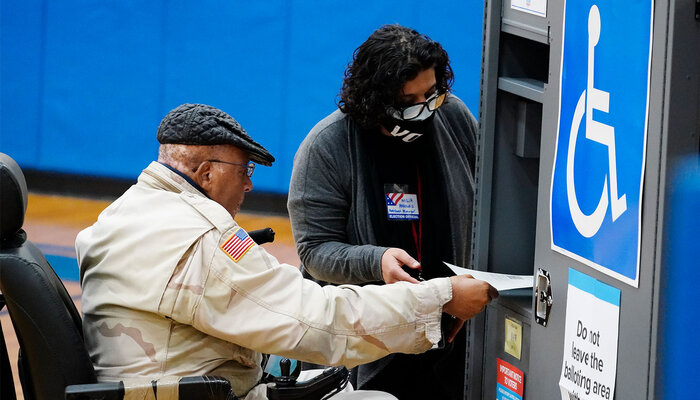In the early months of 2022, residents of the colonias — impoverished communities dotting Texas’s Rio Grande Valley — poured into the offices of La Unión del Pueblo Entero (LUPE) seeking help voting. According to LUPE’s executive director Tania Chavez Camacho, it was a mix of chaos and confusion due to a complex set of new voting rules established by a restrictive law the year before.
The March 2022 primaries were the state’s first election since the enactment of Texas’s Senate Bill 1. Many citizens lack education in the colonias, which don’t always have basic services such as paved roads and proper drainage. Of the many changes established by the discriminatory voter suppression law, a new ID provision often tripped up voters the most. For voting by mail, the new rules require voters to include either a driver’s license number or the last four digits of their social security number on the mail ballot application and inside flap of the mail ballot envelope. At the same time, vote assisters, who now must swear “under penalty of perjury” that the voter they are assisting “represented to me they are eligible to receive assistance,” were contending with potential criminal penalties.
The staff at LUPE, which works in the colonias to provide community organizing and social services, were “frightened” by the new language of the vote assister oath. “The fact that somebody could be prosecuted for that, it is inhibiting the ability for community members to have an assister of choice, and also for LUPE staff to be willing to help community members in need of assistance,” Chavez Camacho testified in federal court in Texas.
Chavez Camacho is one of dozens of witnesses who testified last fall in LUPE v. Texas, a consolidated federal lawsuit challenging S.B. 1, which disproportionately harms Black and Latino voters and makes it harder for voters with disabilities or limited language proficiency to receive assistance when casting a ballot. The law also narrows election workers’ ability to stop harassment by partisan poll watchers and bans a host of voting methods that were popular among voters of color. Closing arguments are set to be held on February 13.
Many of LUPE’s 8,000 members are elderly, people with disabilities, or native Spanish speakers with limited English proficiency and literacy — groups that may need help at the polls. Federal law guarantees the right to assistance at the polls for eligible voters who require help. Prior to S.B. 1, LUPE’s staff would assist its members with voting by interpreting ballot instructions, reading ballots aloud for the vision-impaired, or recording the voter’s choices on the ballot on their behalf, among other ways.
“We didn’t think that effects of S.B. 1 at the time were going to be as astronomical as they were and they became more apparent the moment community members started corning into our offices,” Chavez Camacho said.
The fallout from the legislation’s changes and the ensuing confusion in Texas’s March 2022 primary was far-reaching. The new voter ID provision triggered thousands of ballot rejections and significantly disenfranchised Latino, Asian, and Black voters, who were at least 30 percent more likely to have an application or mail ballot rejected than white voters, a Brennan Center analysis found.
At trial, Kenneth Mayer, a professor of political science at the University of Wisconsin-Madison, described the new ID requirement as an “onerous burden that resulted in far higher rejection rates for minority voters.” Groups challenging the law submitted a report by Mayer to illustrate the disproportionate impacts of the law on voters of color.
Mayer also concluded that “the provisions of S.B. 1 did not contribute to increased election security.” The judge presiding over the trial recently ruled that the mail ballot identification requirement violates federal law.
S.B. 1 was part of a historic torrent of restrictive voting laws enacted in 2021, which saw more such laws than any year since 2011, when the Brennan Center started tracking them. But S.B. 1 set itself apart for its breadth: the law includes at least two dozen provisions targeting voting access. One in particular nixed drive-thru voting, a method employed during the Covid-19 pandemic that was popular among voters of color.
Deion Dorsett, a Black resident in Houston who works at the U.S. Department of Labor and previously served in the national guard, said he “rarely” misses an election and identifies voting as a “core” tenet of his family. Even during the pandemic, he used the drive-thru voting option to vote in the November 2020 election. He called the experience “seamless,” since it took him a mere 10 minutes to cast his ballot compared to the four hours he waited in line to vote during the primary election earlier that year. Despite the success that voters like Dorsett experienced with drive-thru voting, S.B. 1 stripped voters of this option.
“To hear that an opportunity to access was removed didn’t sound like [S.B. 1] was trying to protect the rights of the people,” he testified.
Proponents of S.B. 1 claim the legislation was enacted to improve election integrity after former President Trump and his acolytes sowed doubt about the legitimacy of the 2020 election. However, the evidence shows that such concerns are unfounded and instead used as a guise to discriminate against voters of color and make it harder to exercise the franchise. Despite rampant lies and conspiracy theories about voter fraud, the 2020 election was the "most secure in American history," according to the Department of Homeland Security. And voter fraud is exceptionally rare. Still, Texas state lawmakers maneuvered the bill through the legislature and onto the governor’s desk in the year after the 2020 election.
The tightened restrictions and potential legal penalties under S.B. 1 are not only confusing for some voters and vote assisters, but also discriminatory.
For Jennifer Miller, who has lived in Austin for decades years with her husband and 25-year-old daughter Danielle, voter assistance is part of her routine. Miller’s daughter is on the autism spectrum and has learning and writing disorders. As a result, Jennifer helps her daughter with specific needs, such as transportation, financial decisions, and voting, whether in person or by mail.
Because of her daughter’s dysgraphia, Miller explained, it’s “very, very hard to read her writing.” Without assistance, her daughter would have a difficult time voting either by mail or in person.
In the 2022 midterms, Miller was again by Danielle’s side, helping her cast a ballot. But under S.B. 1’s changes, she said she felt “really nervous,” much like the staff at LUPE. “The word perjury is in there. I know I’m doing everything right, but it sounds very threatening and intimidating,” she explained.
Despite her fears, Miller was determined to help her daughter vote. “I love my daughter,” she testified. “My daughter just needs a little more help, but she can vote. It’s her constitutional right.”
Still, she wondered, “Why are you making it so hard for people with disabilities to vote?”
Texas voters are left disillusioned and daunted by the legislature’s continued efforts to restrict access to the ballot for millions of eligible voters in a state that already had some of the most challenging barriers to voting in the country.
As Dorsett put it, “I think it sends [a message] that we don’t want everyone to be a part of the process.”







